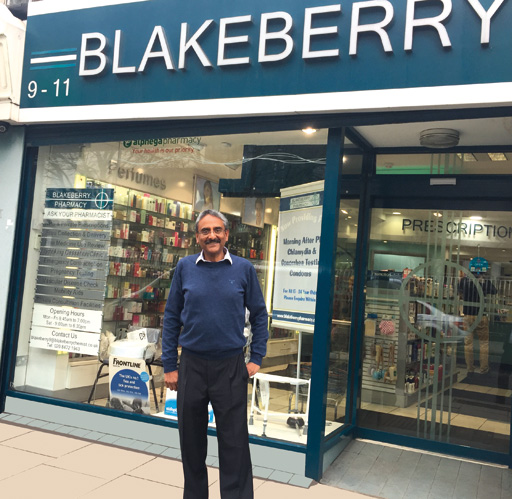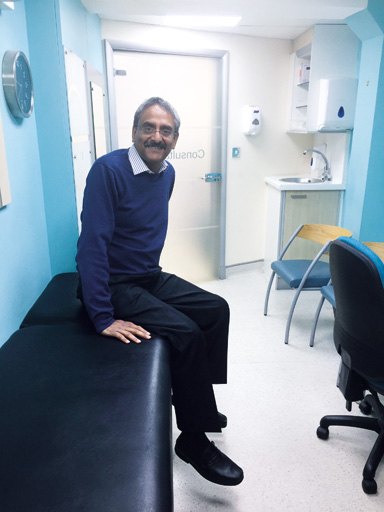Practice

Pharmacy profile: Dushyant Patel
In Practice
We know you want to continue to build on your practice, why not hear from others in the sector striving to do the same.Bookmark
Record learning outcomes
In uncertain times for community pharmacy, Blakeberry Pharmacy in East London has sought to embrace change by spearheading new services. Owner Dushyant Patel explains how the pharmacy’s sexual health offering has led to greater local awareness

Newham pharmacist Dushyant Patel has been practising in East London for 37 years. In that time Dushyant has built strong ties with the community he serves, which he describes as “an incredibly diverse population in terms of nationalities, ethnicities and ages”. This demographic richness results in diverse health needs.
An Alliance Healthcare customer, Dushyant says he is driven by the need to “move forward and not stagnate”. The opportunities are waiting to be taken, he says – it is just a case of opening up the right channels.
It is important to think politically, he believes. Services are often commissioned through the local council, so showcasing the pharmacy’s potential to leaders and influencers can really pay off.
Sexual health offering
Perhaps the most distinctive aspect of Blakeberry’s service provision is its sexual health offering. The pharmacy originally got involved in this area several years ago when it was commissioned by Newham Council to provide services as a Shine clinic for young people.
The pharmacy team now provides emergency hormonal contraception and chlamydia testing to service users up to the age of 24 years, as well as distributing condoms via the C-Card scheme and giving much-needed sexual health advice.
Demand for the service is high, Dushyant says, with some service users coming back more than once. When the opportunity came up, the team was keen to take on the challenge, he remarks. “We’re very focused on expanding our clinical service offering. Also, the fact we’ve got a big college across the road means there is a large young population, which translates into significant demand for sexual health services.”
The service capitalises on the convenience pharmacy offers, Dushyant says. “If you want a chlamydia test, you want it now.”
Barts link
An interesting opportunity to expand on this sexual health work came last summer when Barts Health NHS Trust got in touch. The trust was looking for a community pharmacy base in Newham from which it could offer sexual health services and, after a series of visits, opted for Blakeberry.
“The trust was looking for the right premises and chose us,” Dushyant says, adding that Barts was persuaded by the sexual health work Blakeberry already did with the council.
Barts nurses began running regular Monday clinics from January this year, providing a full STI screening service within the pharmacy and treating many infections, although more serious cases such as HIV positive diagnoses are referred to a hospital. The nurses also perform partner tracing if any tests come back positive.
Blakeberry had to make a few changes in preparation for its new role. “Barts wanted a defibrillator, so we got one; it wanted oxygen – so we did that too,” says Dushyant. “There were also requirements for special procedures for needles for HIV testing and so on, but these were already in place with our travel health service.”
An accessible bathroom, installed as part of a major refit to the pharmacy several years ago, is used for collecting urine samples.
Three or four Barts nurses are at the pharmacy every Monday, seeing both walkin patients and those who have booked online. They use the pharmacy’s main consultation room, which is also used for services such as anticoagulation monitoring.
The pharmacy is well equipped for the demands of the sexual health service, Dushyant says, both in terms of the scope and nature of the service, and the sheer volume of people that are seen.
“The nurses might deal with 40 or 50 patients, who are first seen by a member of my staff straight away. My team will ask some basic questions but nothing too in-depth as the nurses will handle things.”
Thanks to the work with Barts, Blakeberry is the highest provider of EHC in the whole of Newham borough, Dushyant says. “Even coil fittings are being done in the pharmacy, something that no other community pharmacy is offering at the moment.”
Boon for business
Dushyant describes this sexual health work as a boon for the pharmacy. “It helps us create stronger ties with local health services. For example, the ambulance service knows that we now have a defibrillator machine, as does the local surgery.”
In addition to hosting Barts services, Dushyant has plans to expand his locally commissioned service offering. While it is currently restricted to providing ellaOne in the local scheme, a new PGD in November will allow him to supply azithromycin, “bringing the treatment into the pharmacy”, Dushyant says.
The pharmacy refit was crucial in getting service-ready. “It took me almost a year-and-a-half of planning and a lot of money, but it has paid off,” he says.
Raising awareness
The pharmacy’s sexual health workload has “gone up miles” since the Barts nurses started coming in, Dushyant says, and while it is difficult to give an exact number, he thinks the increased awareness has translated into higher overall footfall. “It is great for the prestige of pharmacy,” he adds. “What we’re really interested in promoting is the range of things that can be done through community pharmacy.”
He compares the challenges of winning patients round to when the pharmacy started doing warfarin management 10 years ago. “The patients were a bit suspicious at first and wanted to see we were properly set up to do blood tests. Once they started coming, they found it was much more convenient to walk in here than attend the hospital [for INR monitoring].”
Dushyant talks about the need to get patients on board. “People don’t know what we do in community pharmacy. If you say to someone you’re involved in warfarin management, they often ask whether we are qualified to do things like that. It is human nature but it is also due to the way in which pharmacy has been portrayed over the years – people associate anything clinical with GPs and nurses.”
Great relationship
The pharmacy has “a great relationship” with local GPs, Dushyant says, and he often finds surgeries are happy for him and his team to shoulder work such as atrial fibrillation testing and anticoagulation management. “We attended the same courses,” he says. And while some pharmacies have had unpleasant run-ins with local surgeries over flu jabs, Blakeberry had the opposite experience. “My GPs ran out of flu jabs in December and were sending patients to us.”
The pharmacy provides plenty of other services as well. “We do nursing home visits where a pharmacist will go in once a week, check off all the medicines and inform the GP if there are any clinical issues.” The pharmacy also oversees fittings for disability aids in the homes of stroke patients.
Looking ahead
Now is a crucial time for community pharmacy and survival will be partly determined by whether pharmacies embrace services, says Dushyant. “It is make or break time. If you’re not going to [enhance your service offering], I can’t see a future. We can all dispense.”
Don’t be put off by the possibility of taking a short-term financial hit, he says. Growing a business requires investment. “Initially when you do these services you lose money. It has got to be focused on the long-term.”
It starts with pharmacists recognising their clinical skills and making the most of their training, he says. “The problem is over the years we have not promoted ourselves at all. My pre-reg has spent four years at university doing an in-depth, clinical degree and then another year of on-the-job training. There is all that clinical expertise but we don’t use it.”
The funding climate has changed, he says, and “if we don’t change ourselves, we are doomed”.

